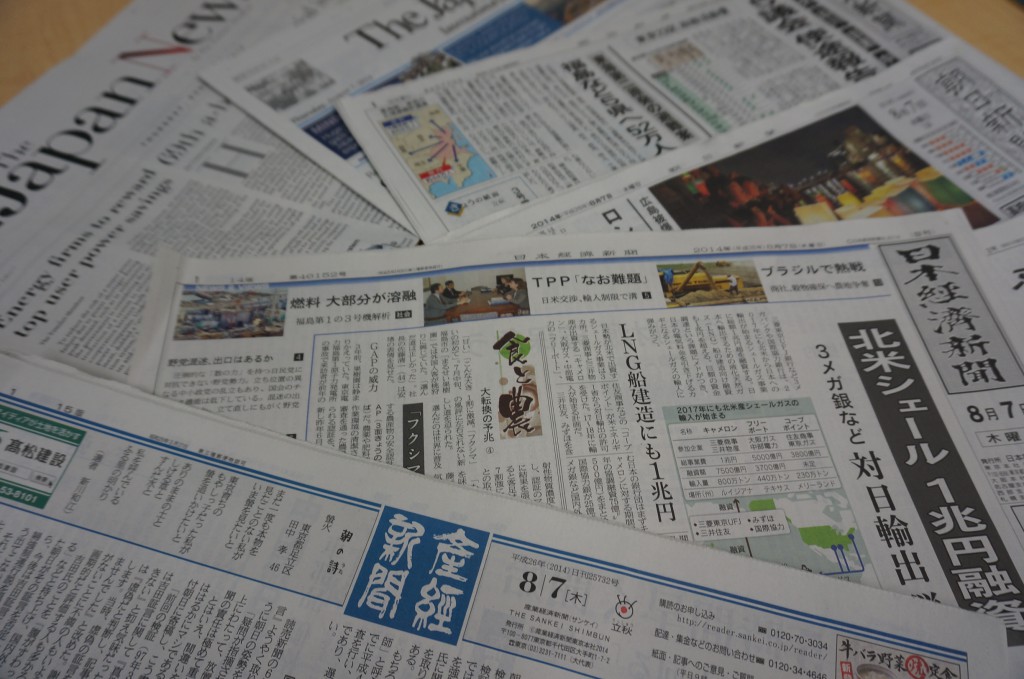A summary of editorials from leading Japanese newspapers (October 24, 2014)
A summary of editorials from leading Japanese newspapers, posted biweekly.
Two female Cabinet members resigned on Oct. 20, dealing a major blow to the administration of Prime Minister Shinzo Abe who had appointed them just six weeks earlier to demonstrate his determination to pursue a “society where all women shine.”
Economy, Trade and Industry Minister Yuko Obuchi and Justice Minister Midori Matsushima tendered their resignations after being engulfed in separate politics-and-money scandals.
Obuchi’s scandal involved, among other issues, theater outings organized by Obuchi’s political organizations for her supporters. According to her political funds reports, spending related to the outings was about \42 million in excess of the revenue. If the political organizations covered the shortfall, it could be a violation of the Public Offices Election Law.
Matsushima, meanwhile, distributed uchiwa fans to people in her constituency at local events, which also could be a violation of that law.
All five national newspapers wrote about the “double resignation” in their editorials on Oct. 21, criticizing the two ministers for the scandals and holding Abe responsible for appointing the female politicians.
Abnormal event
The Asahi Shimbun, The Mainichi Shimbun and The Sankei Shimbun described the simultaneous resignations of Obuchi and Matsushima as “abnormal.”
“It is an abnormal situation, in which high-profile ministers resigned less than two months after the Cabinet reshuffle,” The Sankei said. “A series of suspected illegal acts by Cabinet ministers will considerably impair public trust in politics. Their downfall betrayed efforts to promote the active participation of women in society. Their resignation, therefore, was inevitable.”
Although The Asahi said Obuchi’s departure on the fifth day after the scandal erupted “may qualify as a fine departure” in comparison with embattled politicians in the past, “her swift resignation seems to indicate that the alleged misuses of political funds were too egregious to be explained away in Diet sessions.”
The Mainichi said there was laxity in managing political funds on the part of Obuchi, who took over the Diet seat occupied by her father, the late former Prime Minister Keizo Obuchi.
“She is apparently being forced to pay the price for taking advantage of organized support she had taken over from her father in an easy-going manner,” The Mainichi said. “Basically, her awareness of the need to manage her political funds is too naïve.”
The Nihon Keizai Shimbun (Nikkei) said Obuchi’s resignation as minister will not bring the scandal to a close. If an investigation by a third party fails to clarify how the money was used, “she must take further political responsibility by resigning as a Diet member and in other ways.”
The Yomiuri Shimbun also said Obuchi should not be allowed to “use her resignation to draw a curtain on the problem.”
“It should be discussed that she will give an explanation of the matter such as at the House of Representatives’ Deliberative Council on Political Ethics,” The Yomiuri said.
Meanwhile, the national dailies, except The Yomiuri, questioned Matsushima’s caliber as justice minister. Matsushima has maintained the uchiwa fans she distributed were “material for discussion”, as text was printed on them.
For example, The Nikkei said it was odd for the justice minister—the guardian of law—to talk about what can be taken as a loophole in law. “We must say she lacked the caliber as minister in the first place,” the newspaper said.
Abe’s responsibility
The Asahi, The Mainichi and The Nikkei said Abe carried heavy responsibility for appointing Obuchi and Matsushima, while The Yomiuri said, “It can be said that investigations into their past careers and personal lives before their appointment as ministers must have been sloppy.”
The Sankei said, “Some point out laxity in the Abe administration.” The Asahi said, there may be “lax discipline and complacency” and “questionable political inclinations” in the Abe administration.
The Asahi, The Mainichi, The Nikkei and The Yomiuri urged Abe to steadily carry out policies to restore public trust in his administration. The Sankei urged the Liberal Democratic Party to make the use of political funds more transparent.
*English translations of The Yomiuri, The Asahi, and The Mainichi are from The Japan News, The Asia & Japan Watch and The Mainichi, respectively. Those for The Sankei and The Nikkei are provisional. The content of this page was made by the Foreign Press Center/Japan and does not reflect the opinion of the Japanese Government or any other organization.



